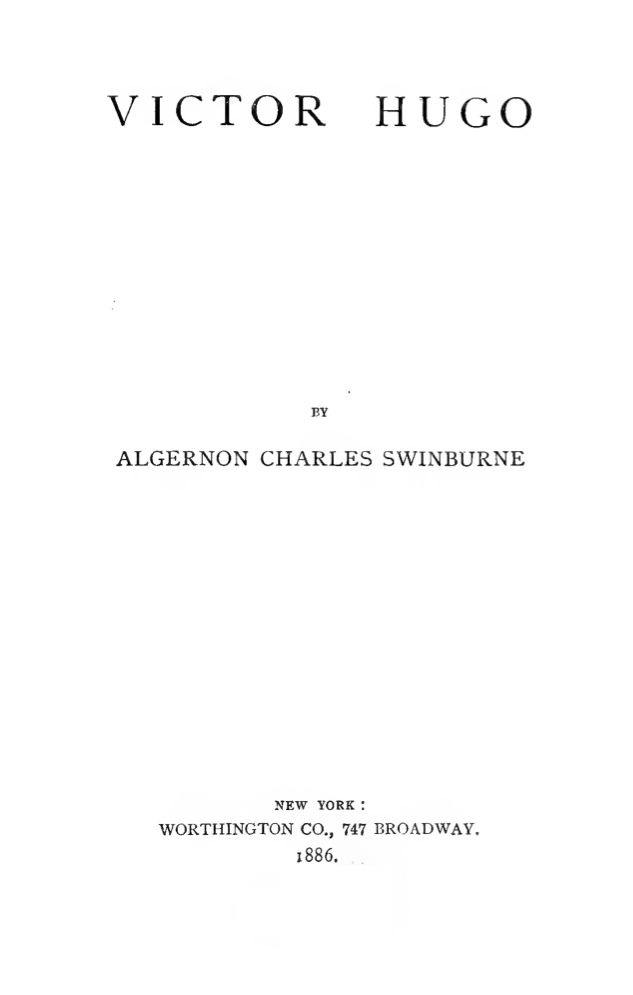
VICTOR HUGO
BY
ALGERNON CHARLES SWINBURNE
NEW YORK
WORTHINGTON CO., 747 BROADWAY
1886
TABLE DES MATIÈRES
THE WORK OF VICTOR HUGO
LA LÉGENDE DES SIÈCLES
THE WORK OF VICTOR HUGO
In the spring of 1616 the greatest Englishman of all time passed awaywith no public homage or notice, and the first tributes paid to hismemory were prefixed to the miserably garbled and inaccurate edition ofhis works which was issued seven years later by a brace of players underthe patronage of a brace of peers. In the spring of 1885 the greatestFrenchman of all time has passed away amid such universal anguish andpassion of regret as never before accompanied the death of the greatestamong poets. The contrast is of course not wholly due to theincalculable progress of humanity during the two hundred and sixty-nineyears which divide the date of our mourning from the date ofShakespeare's death: nor even to the vast superiority of Frenchmen toEnglishmen in the quality of generous, just, and reasonable gratitudefor the very highest of all benefits that man can confer on mankind. Forthe greatest poet of this century has been more than such a force ofindirect and gradual beneficence as every great writer must needs be.His spiritual service has been in its inmost essence, in its highestdevelopment, the service of a healer and a comforter, the work of aredeemer and a prophet. Above all other apostles who have brought useach the glad tidings of his peculiar gospel, the free gifts of hisspecial inspiration, has this one deserved to be called by the mostbeautiful and tender of all human titles—the son of consolation. Hisburning wrath and scorn unquenchable were fed with light and heat fromthe inexhaustible dayspring of his love—a fountain of everlasting andunconsuming fire. We know of no such great poet so good, of no such goodman so great in genius: not though Milton and Shelley, our greatestlyric singer and our single epic poet, remain with us for signs andexamples of devotion as heroic and self-sacrifice as pure. And thereforeit is but simply reasonable that not those alone should mourn for himwho have been reared and nurtured on the fruits of his creative spirit:that those also whom he wrought and fought for, but who know him only astheir champion and their friend—they that cannot even read him, butremember how he labored in their cause, that their children might fareotherwise than they—should bear no unequal part in the burden of thisinfinite and worldwide sorrow.
For us, who from childhood upwards have fostered and fortified whateverof good was born in us—all capacity of spiritual work, all seed ofhuman sympathy, all powers of hope and faith, all passions andaspirations found loyal to the service of duty and of love—with thebread of his deathless word and the wine of his immortal song, the onething possible to do in this first hour of bitterness and stupefactionat the sense of a loss not possible yet to realize, is not to declaimhis praise or parade our lamentation in modulated effects or efforts ofpanegyric or of dirge: it is to reckon up once more the standing accountof our all but incalculable debt. A brief and simple summary of hispublished works may probably lay before the student some points and somedetails not generally familiar to the run of English readers: and I knownot what better